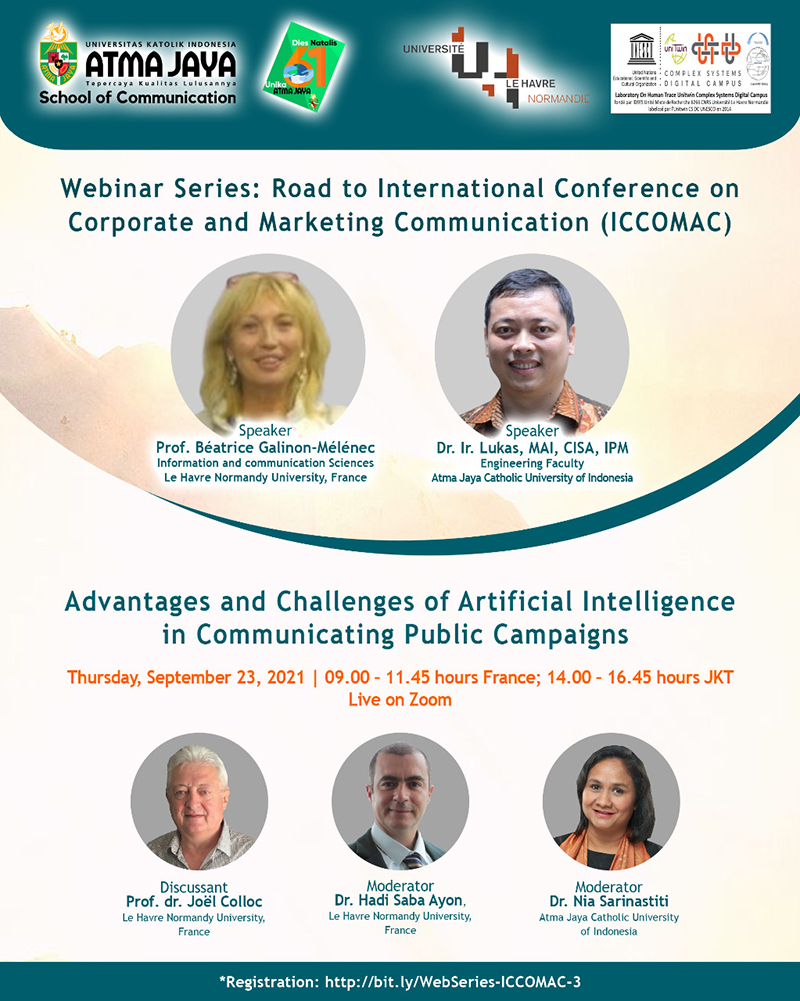
ASK
ME

REGISTER
NOW

Mari bergabung bersama kami di Webinar Series Ke-3: Road to International Conference on Corporate and Marketing Communication (ICCOMAC) 23 September 2021, 14.00 - 16.45 WIB.
Sekolah Komunikasi Universitas Katolik Atma Jaya (UNIKA Atma Jaya) bekerjasama bersama Universitas Le Havre, Normandy, Prancis sebagai tuan rumah, untuk berdiskusi dengan tema "Keuntungan dan Tantangan dari Artificial Intelligence dalam Mengkomunikasikan Kampanye Publik."
Daftarkan diri Anda melalui: http://bit.ly/WebSeries-ICCOMAC-3
Sertifikat gratis bagi peserta yang mengikuti hingga akhir acara.
Event ini akan dilaksanakan dalam bahasa Indonesia dan Prancis.
Terms of Reference
3rd Webinar - Road to ICCOMAC
September 23, 2021
09.00 – 11.45 hours France; 14.00 – 16.45 hours JKT
Advantages and Challenges of Artificial Intelligence in Communicating Public Campaigns
We are currently in times when the Internet is the main infrastructure for human communication and networked computers increase our cognitive abilities. In this digital environment, the slightest act of communication leads to an exponential multiplication of traces. According to NetApp, the amount of data that is generated, by both humans and machines, far outpaces humans’ ability to absorb, interpret, and make complex decisions based on that data.
But we are now witnessing the birth of a new way of managing, analyzing, and using data: Artificial Intelligence (AI). It “refers to systems that display intelligent behavior by analyzing their environment and taking actions – with some degree of autonomy – to achieve specific goals. AI-based systems can be purely software-based, acting in the virtual world (e.g., voice assistants, image analysis software, search engines, speech and face recognition systems) or AI can be embedded in hardware devices (e.g., advanced robots, autonomous cars, drones or Internet of Things applications).
It is communication – particularly interpersonal conversational interaction – that provides AI with its defining test case and experimental evidence. David Gunkel, Professor of Media Studies at Northern Illinois University, stated that recent developments in AI introduce new challenges and opportunities for communication. The conventional sending and receiving information without the use of technology can be horrifying when wanting to reach out to the public. Technologies such as machine translation of human languages, spoken dialogue systems like Siri, algorithms capable of producing publishable journalistic content, and social robots are all designed to communicate with users in a human-like way. Does that mean that AI will take over the role of humans?
While machines can perform some tasks better than humans (e.g., data processing, message selection), this fully realized vision of general AI does not yet exist outside the sci-fi movies. That’s why human-machine collaboration is crucial—in today’s world, artificial intelligence remains an extension of human capabilities, not a replacement. Paul Daugherty of Accenture in his book Human + Machine: reimagining work in the age of AI, states that AI paradigm shift is the transformation of all business processes within an organization—whether related to breakthrough innovation, everyday customer service, or personal productivity habits. As humans and smart machines collaborate ever more closely, work processes become more fluid and adaptive, enabling companies to change them on the fly—or to completely re imagine them. Would the use of AI in communication for public outreach can be the solution for mass messaging? Should humans focus on the selected messaging for specific areas, such as locations and cultures? We will hear the thoughts of our panel on the advantages and challenges of AI in communication.
***
Agenda
14.00 – 14.05: Counsellor for Cooperation of the French Embassy in Indonesia/ Director of Institut Français Indonesia - (Mr. Stéphane Dovert).
14.05 – 14.15: Opening speech by host. Director of the UMR 6266 CNRS IDÉES Le Havre laboratory (Prof. Fabien Liénard).
14.15 – 14.25: Vice-president of Le Havre Normandy University, delegate in charge of international affairs (Michael Hauchechorne, Ph.D.)
14.25 – 14.35: Vice Rector for Research & Cooperation of Unika Atma Jaya (Dr. Yohanes Eko Adi Prasetyanto).
14.35 – 14.40: Introduction to the webinar. School of Communication, Atma Jaya Catholic University of Indonesia (Dr. Nia Sarinastiti, M.A.) & Le Havre University, France (Dr. Hadi Saba Ayon).
14.40 – 15.40: Panel Discussion: Engineering Faculty – Atma Jaya Catholic University of Indonesia (Dr. Ir. Lukas, MAI, CISA, IPM,) & Information and communication Sciences – Le Havre University, France (Prof. Béatrice Galinon-Mélénec).
15.40 – 16.15: Q&A Session - Discussant (Dr. Nia Sarinastiti & Prof. Joël Colloc, M.D., Ph.D)
16.15 – 16.20: Closing Remarks from Atma Jaya – Welcoming to ICCOMAC: (Dr. Dorien Kartikawangi, M.Si - Head of the School of Communication at Atma Jaya) & (Dr. Eko Widodo - Dean of FIABIKOM)
Register: http://bit.ly/WebSeries-ICCOMAC-3
Narahubung: secretariate-iccomac@atmajaya.ac.id
Livestreaming at WbTv Normandie:
https://webtv.normandie-univ.fr/permalink/l126195035964f23x3im/iframe/